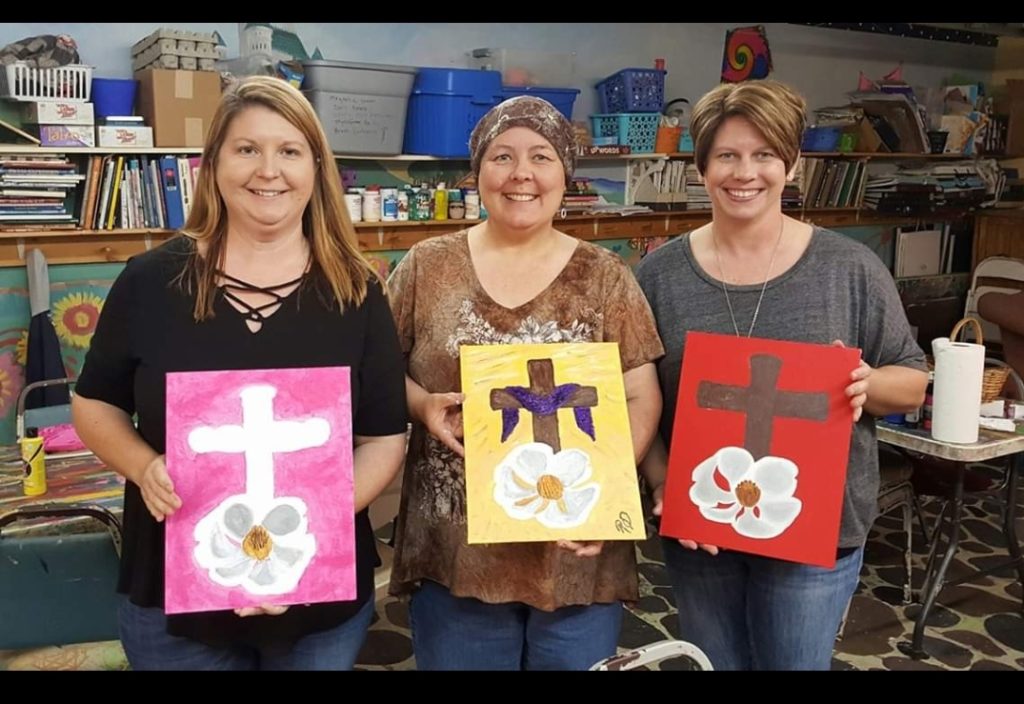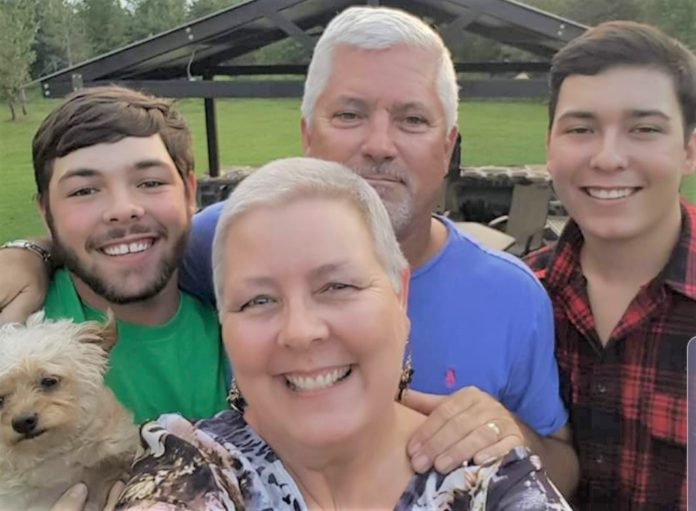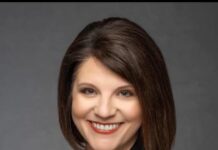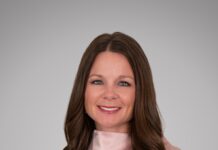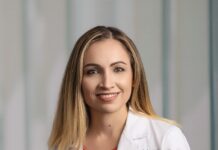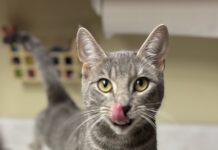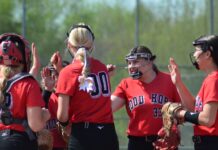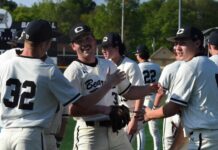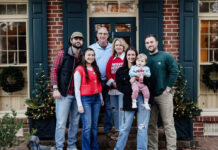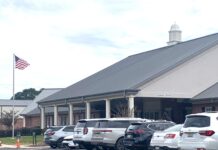Keith and Renee Quick got up on a Saturday morning in July 2016 excited about their plans to meet best friends Dennis and Hollie Barnhart for a day on Lake Guntersville. Their twin boys, Kiefer and Brody, had recently graduated from Cullman High School and the Quicks were enjoying having some freedom to relax. As Renee was getting ready, she noticed something strange in her right breast.
She explained, “It was an indentation. It was like if somebody pokes the Pillsbury Doughboy and his stomach goes in and eventually it fills back out; well mine didn’t. It was like someone poked me in my sleep or something and that indentation was there. I knew that was a sign. I mean I knew! I absolutely 100% knew.”
Renee had always been aware of her body and of any changes due to a family history of breast cancer. That morning, she went ahead and got ready to meet the Barnharts.
Renee told Hollie as they were out on the boat, “A really strange happened. I have this dent in my breast. It’s unusual and I know that’s a sign of breast cancer.”
Hollie told Renee, “You better go the doctor!”
Renee has been an instructor at Wallace State Community College since 1988. She went to the doctor the following Friday when she didn’t have classes.
“I was still two months away for being due for my mammogram. I have one every October, so it had only been 10 months. My previous mammogram was fine; it had been clear,” she said.
Renee had dense breast tissue, so the nurse practitioner sent her to the Women’s Diagnostic Center at Cullman Regional for an Automated Breast Ultrasound System (ABUS) breast ultrasound.
“Usually they will say, ‘Get dressed,’ but the technician told me I needed to see the radiologist,” Renee recalled.
She was there all alone when she realized a mass had been detected. The surgeon came in and performed a biopsy the same day.
She added, “My husband only knew I was going in for a mammogram.”
Renee tells everyone, guys and girls, “You need to be aware of your body. You need to be aware of any change. If someone laughs and says you are silly or paranoid, if something is different, go to the doctor. Get it checked. Don’t wait. Don’t let anyone tell you it’s nothing unless they have a medical degree and they have examined you. I am just really adamant about that.”
Renee was at work on a Thursday when she got a call from the nurse practitioner, who wanted her to come by the office.
Renee said, “No. If it was good news you would have already told me. Its 4:30 and I am ready to go home and eat supper. Just go ahead and tell me.”
That’s when she heard, “Renee, it’s ductal carcinoma.”
“I was very calm,” she said. “I gathered my things and I went to get in my car to go home. I fell apart about halfway home. Have you ever driven in a rain so heavy that you could not see? It wasn’t raining, but it looked like that to me. It was devastating and I got home and lay in the kitchen floor and just cried. Finally, Keith got home from work, and as soon as walked through the door, he knew.”
Renee described her husband as a “man’s man” who continued to reassure her that everything was going to work out. She made the decision to tell her parents next.
She remembered vividly, “I thought my dad was going to pass out. I think he took it worse than my mother did.”
As word got out, Renee noticed people would whisper the word ‘cancer’ or avoid saying the word.
She said, “I have cancer. I didn’t ask for it, but I’m going to deal with it. It’s not embarrassing. It’s not embarrassing to talk about. People get cancer. It’s like they are afraid to talk about it.”
Renee experienced a range of emotions, including calm, devastation and shock.
“I am the one that makes the casserole and takes it to the person who is sick or has cancer or surgery. I’m the one that does those things. It’s very hard for me to let go of being the one in charge.”
Next, Renee met with Dr. Donald Marecle for a PET scan that she admits she was terrified to do.
“It wasn’t as bad as I thought,” she laughed. “Of course, they gave me an Ativan, and that helped. Slept right through it.”
At the follow-up, Renee was Marecle’s last patient of the day-something he does for new breast cancer patients so he can take his time.
She smiled, “Oh, I love Dr. Marecle. I just wanna squeeze him up and hug him. He’s an awesome person and an awesome surgeon. My whole team here in Cullman couldn’t have been any better. I felt so at ease with Dr. Marecle. Then I met Dr. (Steven) Seidel; he’s very straight-forward, very smart and really thorough. He’s so to the point, and I’m a talker. I just talked at him until he just couldn’t stand it anymore and he had to talk with me. He is probably one of the gentlest people that you would ever want to do anything to you.”
Renee had a double mastectomy and latissimus dorsi flap reconstruction and breast implants before undergoing chemotherapy.
“Dr. Seidel is just wonderful. He knows what he’s doing. He knows his stuff. Dr. Marecle does, too,” she said. “They are both phenomenal. I wouldn’t have anybody else. There’s just no way. You could tell me that the most world-renowned surgeon on Earth is at UAB and I would say, ‘There’s two in Cullman, too, and their names are Marecle and Seidel.”
In January 2017, Renee began her three months of chemotherapy with Dr. Johnny Nacilla. She said she appreciated his sense of humor and they shared many laughs.
She recalled her first chemo, how she thought, “My hair’s going to fall out and I’m going to be sick.”
She decided to schedule her chemo on Thursdays to give herself the Friday and weekend to recover before teaching classes the following Monday. She said the first night she felt good but woke up the next day with a terrible sore throat.
“They give you this stuff called ‘magic mouthwash,’ which is a wonderful thing to have.”
When she went back for lab work the following Wednesday, her system had crashed.
Nacilla stressed to Renee that she couldn’t go anywhere and she needed to stay home.
She told him, “I have to work. I really can’t lay around at home. I will go stir-crazy and I want to work.”
He let her go to work, but she had to wear gloves and a mask. She taught with the mask and gloves, and her hair began falling out. She wore scarves and toboggans, but wigs were too itchy.
Several of Renee’s students would come to class early and wipe down all the surfaces with Clorox wipes to help make the classroom safer for the teacher they loved so much. Her co-workers helped cover her classes and gave Renee their own vacation time to make sure she continued to get paid on days she had to miss.
Renee described the only time she had a “pity party.”
“The one time I really got down and out was on a Saturday morning. I got up with giant welts. They were huge and they were all over my head, and I was bald. They were on top of each other and on my ears. The only way to describe the itch was ‘terrifying.’ Keith drove me to urgent care and the doctor felt it was the toxins from the chemo trying to escape through my skin. It spread everywhere …everywhere. I got home and got in the bed and I told Keith, ‘I’m dying, I am going to die. Just let me die. This is horrible.’”
It took several days for the steroids she received from urgent care to begin working.
“I was determined that I was going to live,” she said. “I was going to be OK. I was going to watch my kids through whatever: school, life, marriage, grandkids to spoil and send back to them. That was the couple of days there when I said ‘I’m done! I give up!’ but my husband wouldn’t let me.”
Keith told her to get out of the bed, and she did.
“He pretty much told me that I had to get up. He is a strong man. I got a good one.”
She described her husband as her rock and greatest supporter. Her boys were scared and she was worried about them.
“My husband and two boys took care of me. If I needed or said I wanted anything, my boys would just up and go get it.”
After three months of chemo, Renee had an appointment April 20, 2017 for a PET scan at Marecle’s office.
She finally heard him say, “There is no evidence of disease from your scan.”
She doesn’t remember what he said after that.
That night she went with Hollie and her other best friend Teri Seymore for a painting party at the Shop Around the Corner to celebrate being cancer-free.
She continues to see her doctors for routine maintenance, but has remained cancer-free.
“I am more blessed that I deserve to be. I really am,” said Renee. “I think back over that year of crazy. It’s such a blur, but there are so many standout things that are good things. Food just appeared at our house. I still don’t know if I thanked everyone appropriately. I had people message me on social media that I didn’t even know who were praying for me. It’s unbelievable, the good people in this community. It’s the best place you can be; Cullman, Alabama is the best place you can live. The people here take care of each other and they love each other. I wouldn’t live anywhere else.”
Keith Quick owns Quick Tire Sales in Cullman. The Quicks’ twin sons are now 21: Kiefer is a senior at Troy University and Brody manages the tire center. The family loves the outdoors and has always participated in motor sports. Stony Lonesome OHV Park is one of their favorite places to spend time together. Renee loves her job of 32 years and said she has no plans to retire. She said she does look forward to traveling the country in the family’s RV in the near future with spoiled dog, Baby, the “chipookie.”
Copyright 2019 Humble Roots, LLC. All Rights Reserved.
